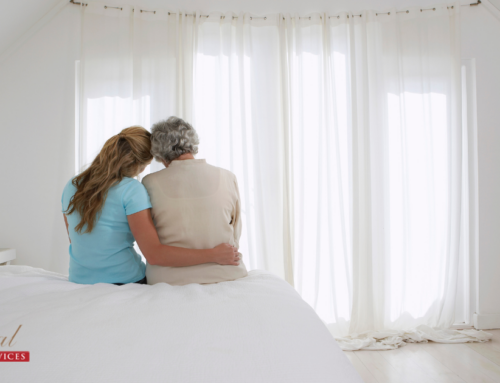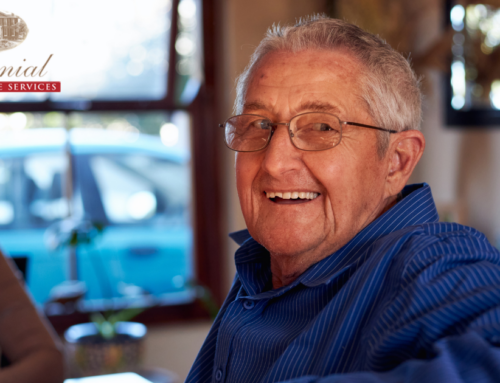There are an estimated 53 million family caregivers in the U.S., and most care for loved ones aged 65+. And although serving as an unpaid senior caregiver is emotionally fulfilling, adding daily caregiving responsibilities to an already full plate can be a recipe for caregiver burnout. Volunteering one’s time and talents while maintaining a healthy life balance requires the ability to set limits and ask for help. If you are currently serving as a family caregiver, here’s how to identify the symptoms of burnout and get the assistance you need before it’s too late.
Warning Signs of Caregiver Burnout
Regardless of their training and experience, most informal caregivers eventually reach a point when they feel overworked, overtired, and overstressed. Exhaustion, worry, inadequate resources, and strained relationships can be a caregiver’s worst enemies.
The average caregiver is more likely to develop a chronic health condition, like elevated blood pressure, heart disease, or diabetes than is a non-caregiver. Caring for a loved one with dementia or Alzheimer’s can be overwhelming for even the most seasoned family caregivers.
Caregiver burnout typically presents with these signs:
- Sleep deprivation
- Anxiety and depression
- Difficulty performing simple tasks
- Weight gain
- Postponing or completely ignoring medical appointments
- Substance abuse
- Not exercising
- Poor eating habits
- Lack of interest in activities once enjoyed
- Social isolation
Ignoring these symptoms won’t make them go away. If allowed to persist, caregiver burnout will eventually affect the health and wellbeing of both you and your care recipient.
Self-Care Tips for Informal Caregivers
Here’s how to enjoy a healthier, more fulfilling life while caring for family and friends:
Set realistic goals
Although it’s not easy to accept, no matter how hard you try your loved one’s condition will eventually worsen. Rather than allowing yourself to get overwhelmed, prioritize your daily tasks and focus on the most important ones— like getting Dad out of the house for some healthy exercise. After all, you’re only human, and Rome wasn’t built in a day.
Make healthy lifestyle choices
If you’re sick in bed (again) because you’re not taking care of yourself, start making some positive lifestyle changes. Eat a well-balanced diet, exercise regularly, and avoid unhealthy habits like smoking cigarettes or drinking alcohol to excess. Get a thorough physical every year, and don’t blow off your other medical appointments.
Reward yourself
Not everyone has what it takes to be a successful caregiver. Reward yourself for a job well done by doing something you enjoy every week. Use your newfound downtime to learn a new hobby, buy a pair of shoes, or just spend a few hours curled up on the couch with a good book. Whatever you do, don’t feel guilty for taking a break from your caregiving duties.
Start a caregiving journal
Another way to emotionally decompress is by keeping a daily caregiving journal. Use it to record both positive and negative experiences that you are going through— like the fact you were able to get Mom to eat everything on her plate today. When you’re having a bad day, go back and revisit the good moments and focus on how your efforts are making a difference.
Make time for yourself
Find time to participate in healthy stress-relieving activities like walking, swimming, cycling, or yoga three to five times per week. Treat yourself at least once a month to a spa day or lunch with your friends. Seek professional counseling if negative feelings like anxiety and depression persist.
Take a well-deserved break
Asking for help doesn’t make you a failure. To prevent burnout, seek relief through community volunteers, family members, friends, or a meal delivery or senior transportation service. Another option you have is hiring a professional respite caregiver from a licensed home care agency.
Reliable In-Home Respite Care for Seniors in Orange County
Although it’s a labor of love, serving as an informal caregiver can also be physically and emotionally exhausting. As a locally owned and family-operated provider, Colonial Home Care Services makes it easy for families to keep their aging loved ones safe— even with little notice in an emergency. At CHCS, we take great pride in carefully selecting and thoroughly screening our caregivers to ensure all have the right skills, knowledge, experience, and personality.
As a family-trusted home care provider serving Orange County, Long Beach, Mission Viejo, and surrounding communities, CHCS has provided peace of mind to those we serve for over 25 years. To learn more now about our award-winning home care services or schedule a FREE in-home assessment for a senior in our service area, please visit us at www.colonialhomecareservices.com.




